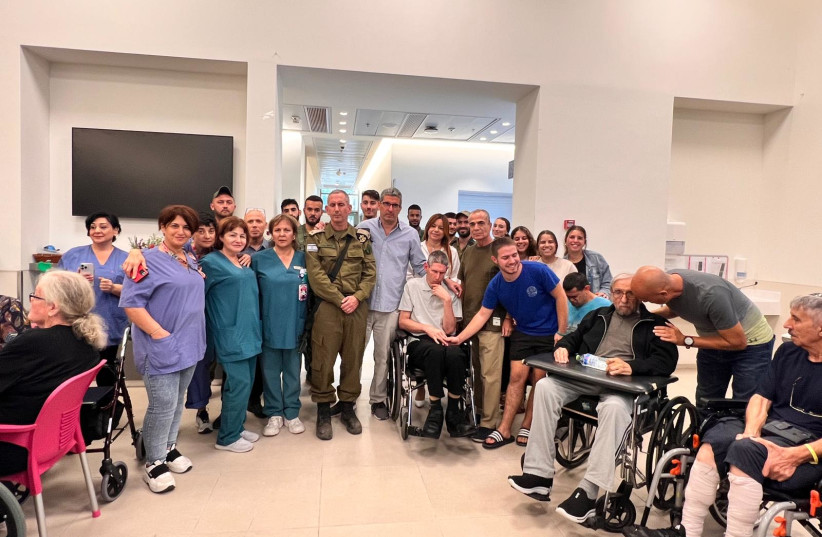Between a visit to what remains of Kibbutz Be'eri close to Gaza to returning to the IDF/Defense Ministry Headquarters in Tel Aviv’s Kirya on Sunday, IDF spokesman Brigadier-General Daniel Hagari – who appears one to several times daily on TV – went to Adi Negev-Nahalat Eran in the Eshkol region to visit his very-disabled brother, Yoni, who was one of the first residents of the village.
Visiting the village’s rehabilitation hospital, the IDF spokesman said: “I am very excited to be here today. We are in difficult days of fighting and need the spirit of Israeli society. This place, which I know from the day it was built, expresses the goodness and strengths of Israeli society.
I am happy to see the great strength that is here and the dedicated care. It gives us a lot of strength and reminds us very well what we are fighting for.”
Avi Wortzman, the director-general of the village and the rehabilitation hospital, added: “We strengthen the hands of our friend, Brigadier General Hagari and of all IDF soldiers. The people of Israel are going through difficult times. We decided to join the national effort and open another rehabilitation department that will add another 28 beds to the 80 that exist in the departments. We invite all residents of the south and soldiers who need rehabilitation to our new and protected rehabilitation hospital. We have a wonderful and professional team here waiting to take care of you.”
"I am happy to see the great strength that is here and the dedicated care. It gives us a lot of strength and reminds us very well what we are fighting for.”
IDF spokesman Brigadier-General Daniel Hagari

Wortzman has served as director of ADI Negev-Nahalat Eran since 2016, working hard to provide a quality home and comprehensive educational, rehabilitative, and social services for hundreds of people with severe disabilities throughout the Negev and across the country.
From founder of Beit Moriah Garin Torani in 1993, he went on to serve as director-general of Jewish Education at Mi’Bereshit and was one of the founders of Masa Israel. In 2002, he won the Prime Minister’s “Magen Le’Yeled” Award for his work in establishing a network of community centers for children at risk, after which he became Beersheba’s deputy mayor in 2008. From 2013 to 2015, he served as an MK and deputy education minister.
Thousands of people with severe disabilities live in Israel
Tens of thousands of toddlers, children, teenagers and adults with severe disabilities live in Israel. These limitations prevent them from performing many and varied actions that for most of us seem simple and trivial, but they do not prevent them from the ability to dream, believe and develop, he added.
“Here at Adi we choose every day to focus not on limitations but on the small and big dreams - and each person's ability to fulfill them,” Wortzman added. There is also a residential center in Jerusalem.
“We believe that ability and limitation, begin in the human spirit. In the treatment centers and the professional rehabilitation facilities, we care for and advance people of all ages who were born with a disability or who suffer from it due to various injuries enable them to flourish and succeed beyond any limitation. And we will always be there for those who are unable to take care of themselves on their own.”
